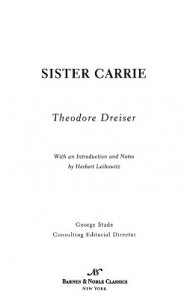Jennie Gerhardt - Драйзер Теодор (книги бесплатно без онлайн .txt) 📗
clothier and shoe man, and, finding that he could only guess at what sizes might be required, ordered the several articles with the privilege of
exchange. When his labours were over, he returned to his room.
"Carrying coal," he thought, over and over. "Really, it was very thoughtless in me. I mustn't forget them any more."
CHAPTER IV
The desire to flee which Jennie experienced upon seeing the Senator
again was attributable to what she considered the disgrace of her position.
She was ashamed to think that he, who thought so well of her, should
discover her doing so common a thing. Girl-like, she was inclined to
imagine that his interest in her depended upon something else than her
mere personality.
When she reached home Mrs. Gerhardt had heard of her flight from the
other children.
"What was the matter with you, anyway?" asked George, when she came in.
"Oh, nothing," she answered, but immediately turned to her mother and said, "Mr. Brander came by and saw us."
"Oh, did he?" softly exclaimed her mother. "He's back then. What made you run, though, you foolish girl?"
"Well, I didn't want him to see me."
"Well, maybe he didn't know you, anyhow," she said, with a certain sympathy for her daughter's predicament.
"Oh yes, he did, too," whispered Jennie. "He called after me three or four times."
Mrs. Gerhardt shook her head.
"What is it?" said Gerhardt, who had been hearing the conversation from the adjoining room, and now came out.
"Oh, nothing," said the mother, who hated to explain the significance which the Senator's personality had come to have in their lives. "A man frightened them when they were bringing the coal."
The arrival of the Christmas presents later in the evening threw the
household into an uproar of excitement. Neither Gerhardt nor the mother
could believe their eyes when a grocery wagon halted in front of their
cottage and a lusty clerk began to carry in the gifts. After failing to
persuade the clerk that he had made a mistake, the large assortment of
good things was looked over with very human glee.
"Just you never mind," was the clerk's authoritative words. "I know what I'm about. Gerhardt, isn't it? Well, you're the people."
Mrs. Gerhardt moved about, rubbing her hands in her excitement, and
giving vent to an occasional "Well, isn't that nice now!"
Gerhardt himself was melted at the thought of the generosity of the
unknown benefactor, and was inclined to lay it all to the goodness of a
great local mill owner, who knew him and wished him well. Mrs.
Gerhardt tearfully suspected the source, but said nothing. Jennie knew, by instinct, the author of it all.
The afternoon of the day after Christmas Brander encountered the mother
in the hotel, Jennie having been left at home to look after the house.
"How do you do, Mrs. Gerhardt," he exclaimed genially extending his hand. "How did you enjoy your Christmas?"
Poor Mrs. Gerhardt took it nervously; her eyes filled rapidly with tears.
"There, there," he said, patting her on the shoulder. "Don't cry. You mustn't forget to get my laundry to-day."
"Oh no, sir," she returned, and would have said more had he not walked away.
From this on, Gerhardt heard continually of the fine Senator at the hotel, how pleasant he was, and how much he paid for his washing. With the
simplicity of a German working man, he was easily persuaded that Mr.
Brander must be a very great and a very good man.
Jennie, whose feelings needed no encouragement in this direction, was
more than ever prejudiced in his favour.
There was developing in her that perfection of womanhood, the full
mould of form, which could not help but attract any man. Already she
was well built, and tall for a girl. Had she been dressing in the trailing skirts of a woman of fashion she would have made a fitting companion
for a man the height of the Senator. Her eyes were wondrously clear and
bright, her skin fair, and her teeth white and even. She was clever, too, in a sensible way, and by no means deficient in observation. All that she
lacked was training and the assurance of which the knowledge of utter
dependency despoils one. But the carrying of washing and the
compulsion to acknowledge almost anything as a favour put her at a
disadvantage.
Nowadays when she came to the hotel upon her semi-weekly errand
Senator Brander took her presence with easy grace, and to this she
responded. He often gave her little presents for herself, or for her brothers and sisters, and he talked to her so unaffectedly that finally the overawing sense of the great difference between them was brushed away, and she
looked upon him more as a generous friend than as a distinguished
Senator. He asked her once how she would like to go to a seminary,
thinking all the while how attractive she would be when she came out.
Finally, one evening, he called her to his side.
"Come over here, Jennie," he said, "and stand by me."
She came, and, moved by a sudden impulse, he took her hand.
"Well, Jennie," he said, studying her face in a quizzical, interrogative way, "what do you think of me, anyhow?"
"Oh," she answered, looking consciously away, "I don't know. What makes you ask me that?"
"Oh yes, you do," he returned. "You have some opinion of me. Tell me now, what is it?"
"No, I haven't," she said, innocently.
"Oh yes, you have," he went on, pleasantly, interested by her transparent evasiveness. "You must think something of me. Now, what is it?"
"Do you mean do I like you?" she asked, frankly, looking down at the big mop of black hair well streaked with grey, which hung about his
forehead, and gave an almost leonine cast to his fine face.
"Well, yes," he said, with a sense of disappointment. She was barren of the art of the coquette.
"Why, of course I like you," she replied, prettily.
"Haven't you ever thought anything else about me?" he went on.
"I think you're very kind," she went on, even more bashfully; she realised now that he was still holding her hand.
"Is that all?" he asked.
"Well," she said, with fluttering eyelids, "isn't that enough?"
He looked at her, and the playful, companionable directness of her
answering gaze thrilled him through and through. He studied her face in
silence while she turned and twisted, feeling, but scarcely understanding, the deep import of his scrutiny.
"Well," he said at last, "I think you're a fine girl. Don't you think I'm a pretty nice man?"
"Yes," said Jennie, promptly.
He leaned back in his chair and laughed at the unconscious drollery of her reply. She looked at him curiously and smiled.
"What made you laugh?" she inquired.
"Oh, your answer," he returned. "I really ought not to laugh, though. You don't appreciate me in the least. I don't believe you like me at all."
"But I do, though," she replied, earnestly. "I think you're so good." Her eyes showed very plainly that she felt what she was saying.
"Well," he said, drawing her gently down to him; then, at the same instant he pressed his lips to her cheek.
"Oh!" she cried, straightening up, at once startled and frightened.




